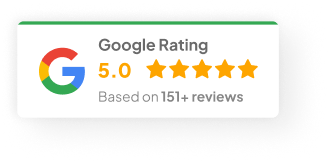03 Oct 25
Custom vs. Template: What’s Better for a Construction Company Web Design?
These days even construction companies can’t rely on word of mouth alone. A company’s website is often the first impression a potential client gets. And it’s not just about looking polished. A strong website can mean the difference between winning a big project or watching that opportunity go to the competitor down the road.
So the question comes up often: is it smarter to go with a custom-built website, or is a template “good enough”?
Both have their place, but the choice affects how clients see the business, how many leads come through the door, and how well the site performs long term.
Custom vs. Template: What’s the Real Difference?
Template Websites
- Pre-designed themes where content, images, and logos get slotted in.
- Cheaper and faster to launch.
- Often rely on drag-and-drop builders with limited flexibility.
Custom Websites
- Built from the ground up, tailored to specific goals, brand, and client behavior.
- Everything from navigation to functionality is designed around the business.
- Allows for flexibility and scalability.
Both will put a construction business online. But the real question is which one delivers leads and long-term value.
Why Custom Websites Pull Ahead
1) Better Lead Generation
For construction, the endgame is simple: leads that turn into projects. A site needs:
- Clear “Request a Quote” buttons
- A strong portfolio that shows off big wins
- Safety certifications, testimonials, and trust markers
Custom sites are designed with conversion in mind from the start.
According to Exprance, custom builds can deliver 2–5× higher conversion rates than templates in the same industries. That difference can easily translate into tens of thousands of dollars in project revenue.
2) Faster Performance
Templates are notorious for bloated code and unnecessary plugins. The result? Slower load times, especially on mobile.
Data backs this up. Just a 1-second delay in page load speed can reduce conversions by 7%. For a construction company, that’s a costly drop in potential leads.
Custom sites are streamlined. Less clutter, faster response. Visitors stick around longer and that’s where projects start.
3) Stronger SEO and Local Visibility
Search rankings aren’t just about keywords. Google looks at site speed, structure, and relevance. Custom websites allow:
- Fine-tuned metadata
- Image optimization
- Local landing pages built for “residential roofing contractor in [city]” searches
Template sites often limit these adjustments. Insights Success highlights that custom builds offer stronger SEO benefits, giving companies a leg up in crowded local markets.
4) Branding That Builds Trust
In construction, trust is currency. Clients want proof – projects, licensing, testimonials. A generic template shared by dozens of contractors undermines credibility.
Custom websites capture a company’s brand identity and communicate reliability. That credibility plays a big role in winning projects where the stakes are high.
5) Built for Growth
Today’s needs aren’t tomorrow’s. Companies often want to integrate:
- Client portals
- Project tracking tools
- 3D walkthroughs or drone footage galleries
Templates struggle with scaling. A custom build, however, can evolve with the business, saving costly rebuilds later.
When a Template Makes Sense
Templates aren’t always the wrong choice. They fit in certain cases:
- Tight budgets when just starting out
- Small, local contractors with simple offerings
- A short-term stopgap before upgrading
With solid photography and strong copy, a template can work in the short run. But as a company grows, it often outgrows the template too.
Cost vs. Long-Term ROI
At first glance, templates win on cost. But custom websites tend to deliver better ROI.
- Custom builds cost more upfront but avoid plugin conflicts and frequent rebuilds.
- Template sites are cheaper day one but usually rack up costs with fixes and redesigns.
For construction firms where a single project can generate tens of thousands, investing in a site built to convert pays off quickly.
Must-Have Features for Construction Websites
No matter the choice, custom or template, these features are essential:
- Portfolio with before-and-after project photos
- Easy “Request a Quote” or contact buttons
- Client testimonials, licensing, and certifications
- Mobile-friendly design
- Local SEO (city-specific landing pages, Google Maps integration)
- Fast load times
- Analytics to track leads and site performance
Why Partner with Chromatix
The right website partner makes all the difference. Chromatix specialises in building WordPress websites that don’t just look good, they convert.
The team has been in business for years, creating websites that bring measurable results for clients. Known for combining design expertise with conversion strategy, Chromatix builds websites that work as hard as the businesses they represent.
For construction companies, that means a digital presence that inspires trust, drives leads, and grows alongside the business.
Which Should You Choose?
For companies serious about growth, a custom website is the smarter play. It’s faster, more reliable, and designed to turn visitors into leads.
If the budget is tight, a template can be a workable starting point. But in competitive markets, a website that mirrors the company’s brand and future growth plans is the one that wins projects.
At the end of the day, a website isn’t just a digital business card. It’s a sales tool. And in construction, where reputation and professionalism carry weight, that tool can make or break success.


